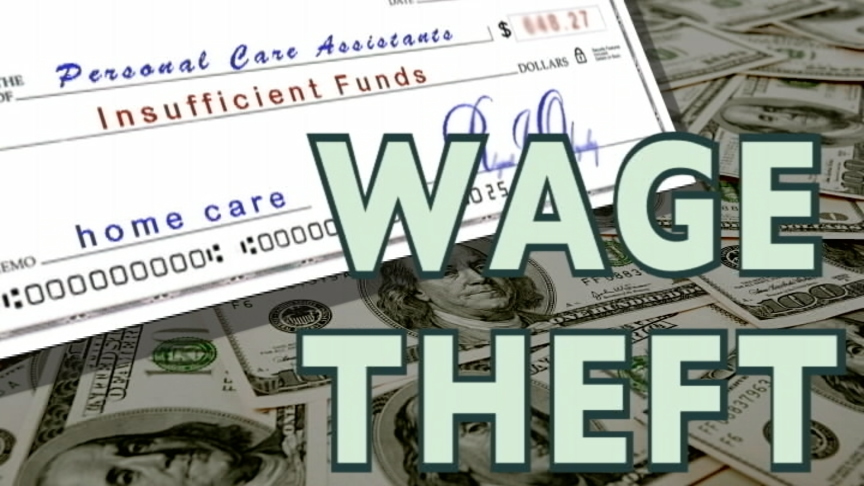

Share
Do you think you might be a victim of wage theft? Here are some warning signs and some steps you can take.
Download this information as a PDF document.
State Violation Signs:
– You have separated from your current employment, but you have not received your final paycheck.
– You have not been paid for your work for 31 days or longer.
– You are paid less than $9 an hour at a large business or less than $7.25 at a small business.
– You work more than 40 hours per week at a large business or more than 48 hours per week at a small business and do not receive overtime pay (1.5X regular pay).
– You are an hourly employee who works off the clock.
– You’ve had money deducted from your paycheck such as work equipment costs or repair costs.
– You work on a state-funded construction project, but you are paid less than the prevailing wage.
– You work four consecutive hours without a paid short rest break.
– You work eight or more hours without an unpaid meal break.
– You are not given pay stubs detailing your hours and wages.
– You are a tipped employee and your employer counts your tips toward your hourly minimum wage requirement.
Solutions:
– Contact the Labor Standards Division at the Minnesota Department of Labor and Industry at (651) 284-5070 or by e-mail.
– Reach out to community organizations or worker centers who may be able to help you recover stolen wages if your complaint cannot be investigated by the state.
Federal Violation Signs:
– You work for a large employer or you deal with interstate commerce (e.g. driving across state lines or swiping credit cards) and you work more than 40 hours per week with no overtime pay.
– You are a visa or migrant worker who is not receiving the correct hourly wage, which is typically higher than the federal minimum wage of $7.25.
– You work on a federally funded project and you are not paid the federal prevailing wage.
Solutions:
– Contact the Wage & Hour Division at U.S. Department of Labor at (612) 370-3341.
– Reach out to community organizations or worker centers who may be able to help you recover stolen wages if your complaint cannot be investigated by the federal government.
Misclassification Signs:
– You work as an independent contractor when your work duties and how you perform your work is determined by the company that pays you.
Solutions:
– File IRS form SS-8 to determine whether you should be classified as an employee.
– Reach out to community organizations or worker centers who may be able to help you recover stolen wages.
Wage Theft in the Agriculture Industry:
Warning Signs and Solutions
State Violation Signs:
– You work for a large employer who grosses $500,000 or more a year and
– You are paid less than $9 an hour.
– You are an hourly employee and you are not paid overtime (1.5X base pay) for your hours worked over 48 per week.
or
– Your salary is less than $661.50 per week.
– You work for a small employer who grosses less than $500,000 a year and
– You are paid less than $7.25 an hour.
– You are not paid overtime (1.5X base pay) for your hours worked over 48 per week
or
– Your salary is less than $532.88 per week.
Learn more about state requirements for agriculture workers at the Department of Labor and Industry website.
Solutions:
– Contact the Labor Standards Division at at the Minnesota Department of Labor and Industry at (651) 284-5070 or by e-mail.
– If your complaint cannot be investigated by the state, reach out to community organizations such as:
– The Greater Minnesota Worker Center – 1-320-774-1328 – http://mygmwc.org
– Centro Campesino – (507) 446-9599 – http://mncentrocampesino.org
Keep in mind:
If you decide to move forward with filing a complaint with MN-DLI or US DOL, it may be beneficial to provide proof of the violation, such as paystubs, if you have them.
Your employer is required to keep payroll records for three years, so it is possible for you to recover stolen wages from as long as three years ago. However, in most of the case files Workday Minnesota requested from MN-DLI, investigators pursued an audit period of two years.
If state or federal enforcement agencies decide to proceed with an investigation, you may not receive your back wages for years, depending on the complexity of your case.
Note: These warning signs may not be a wage violation in the eyes of the state or federal government due to numerous exemptions. Visit the US DOL webpage for more information or the MN-DLI website for more information and resources on your rights.
Workday is interested in your comments about our wage theft series. Contact us here or through our Facebook page or Twitter account.

